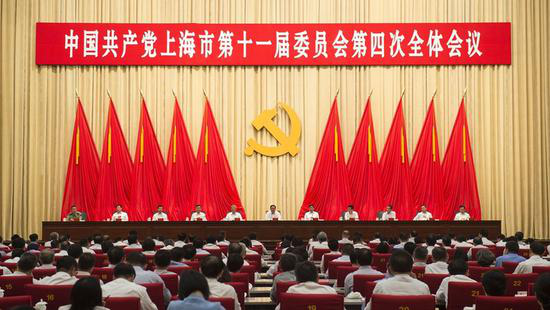Shanghai works on improving global competitiveness


Shanghai, China's largest economic center and a global city, proposes improving its global status and core competitiveness at a plenary session on June 27. [Photo/sina.com.cn]
Shanghai, China's largest economic center which is ranked as an Alpha+ city on the Globalization and World Cities Research Network, discussed ideas and proposals on how to improve its global status and core competitiveness at a plenary session on June 27.
Improving global resources allocation capacity, innovation capacity, and having more of a voice in making international industry standards are considered key to achieving these goals.
As of March 2018, Shanghai placed 6th on the Global Financial Centres Index. But Zheng Yang, director of the Shanghai Financial Service Office, said that the city's financial market still has plenty of room for growth.
Zheng proposed increasing the involvement of overseas investors in Shanghai's economy, as this is a way the city's global resources allocation capacity can be enhanced.
Currently, the amount of foreign investment in the city's stock market is less than 5 percent, in the bond market is less than 2 percent, and in the futures market is only 0.4 percent.
The increase of regional GDP and GDP per capita is also necessary, as Shanghai's overall economy still lags behind the economic powerhouses of London and New York, according to Chen Jie, deputy head of Lingang Area Development Administration.
Liu Yan, head of the Science and Technology Commission of Shanghai, talked about the importance of a city's innovation capacity and announced the construction of new scientific facilities in sectors such as brain science and brain-inspired intelligence, artificial intelligence, and aviation, in order to advance the city’s technological innovation.
This move is in line with the city's goal of developing into a world leading scientific and technological innovation center.
Zhu Qinhao, director of the Shanghai Civil Affairs Bureau, stated that Shanghai will continue to build up its four brands - service, manufacturing, shopping and culture - to encourage local companies to participate in the making of international industry standards.
MOST POPULAR
- 1 China to give visa-free treatment to another 9 countries
- 2 China fully opens manufacturing sector to foreign investors in landmark opening up move
- 3 China's import expo attracts record-breaking participating countries, exhibitors
- 4 China's door opening even wider to foreign visitors, businesses
- 5 China revises rules to ease foreign strategic investment in listed firms
Editors' Picks
 Video:
Peru sees new port open
Video:
Peru sees new port open
 Infographic:
China's public holidays for 2025
Infographic:
China's public holidays for 2025
 Infographic:
Basic facts of APEC
Infographic:
Basic facts of APEC
 Infographic:
Wrapping up the 7th CIIE: Data recap
Infographic:
Wrapping up the 7th CIIE: Data recap



